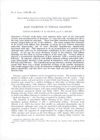 6 citations,
January 2020 in “Skin Pharmacology and Physiology”
6 citations,
January 2020 in “Skin Pharmacology and Physiology” HIF-1α stimulators, like deferiprone, work as well as popular hair loss treatments, minoxidil and caffeine, in promoting hair growth.
 5 citations,
January 2022 in “PloS one”
5 citations,
January 2022 in “PloS one” Deleting the p63 gene in certain cells causes problems in thymus development and severe hair loss in mice.
 43 citations,
January 2007 in “American Journal of Clinical Dermatology”
43 citations,
January 2007 in “American Journal of Clinical Dermatology” Combined minoxidil and tretinoin solution works as well as regular minoxidil for male hair loss.
 3 citations,
June 2021 in “Cosmetics”
3 citations,
June 2021 in “Cosmetics” A mix of sulforaphane, L-menthol, and dexpanthenol could help increase hair growth and reduce hair loss.
 October 2024 in “Journal of Advanced Pharmaceutical Technology amp Research”
October 2024 in “Journal of Advanced Pharmaceutical Technology amp Research” Trigonelline nanocrystal cream effectively promotes hair growth and may reduce side effects.
 January 2024 in “International journal of chemical research and development (Print)”
January 2024 in “International journal of chemical research and development (Print)” Low levels of vitamin B12, iron, ferritin, and zinc are linked to hair loss in Iraqi women.
 91 citations,
January 2009 in “International Journal of Trichology”
91 citations,
January 2009 in “International Journal of Trichology” Different hair evaluation methods have their own pros and cons, and using multiple methods together is best for accurate hair loss diagnosis and tracking.
 63 citations,
October 1972 in “British Journal of Dermatology”
63 citations,
October 1972 in “British Journal of Dermatology” Women with thinning hair have thinner hair strands than women without hair loss.
 47 citations,
April 2000 in “The American journal of pathology”
47 citations,
April 2000 in “The American journal of pathology” Bcl-2 overexpression protects against UVB damage but worsens hair loss from chemotherapy.
 31 citations,
October 2002 in “Dermatologic Surgery”
31 citations,
October 2002 in “Dermatologic Surgery” Minoxidil helps stabilize hair loss, increase density, and reduce shedding after hair transplant surgery.
 27 citations,
February 2017 in “Clinical, Cosmetic and Investigational Dermatology”
27 citations,
February 2017 in “Clinical, Cosmetic and Investigational Dermatology” New compounds were found to help increase hair growth and decrease hair loss.
 20 citations,
May 2020 in “Experimental Dermatology”
20 citations,
May 2020 in “Experimental Dermatology” Aging scalp skin contributes to hair aging and loss, and more research is needed to develop better hair loss treatments.
 9 citations,
July 2011 in “Scientific Reports”
9 citations,
July 2011 in “Scientific Reports” Changes in the HR gene have influenced hair growth and may lead to hair loss conditions in humans.
9 citations,
September 2009 in “PubMed” Antigen presenting cells around hair follicles are crucial in SLE-related hair loss.
 4 citations,
June 2020 in “JAAD case reports”
4 citations,
June 2020 in “JAAD case reports” Permanent hair dye may cause total hair loss.
 3 citations,
June 2006 in “Expert Review of Dermatology”
3 citations,
June 2006 in “Expert Review of Dermatology” The document concludes that hair loss is complex, affects many people, has limited treatments, and requires more research on its causes and psychological impact.
2 citations,
January 2023 in “Frontiers in Oncology” Mild oxidative stress can prevent hair loss from chemotherapy.
 2 citations,
February 2021 in “The Journal of clinical and aesthetic dermatology”
2 citations,
February 2021 in “The Journal of clinical and aesthetic dermatology” Understanding the cause of bitemporal hair loss is key to deciding the right treatment.
1 citations,
December 2023 in “Biomolecules” Regulating cell death in hair follicles can help prevent hair loss and promote hair growth.
 1 citations,
January 2016 in “Journal of stem cell research and medicine”
1 citations,
January 2016 in “Journal of stem cell research and medicine” Fat-derived stem cell therapies can potentially increase hair growth and thickness in people with hair loss.
 1 citations,
January 2016 in “Journal of stem cell research and medicine”
1 citations,
January 2016 in “Journal of stem cell research and medicine” Fat-derived stem cell therapies can potentially increase hair growth and thickness in people with hair loss.
 April 2024 in “Scientific reports (Nature Publishing Group)”
April 2024 in “Scientific reports (Nature Publishing Group)” Rosemary and neem extract may be an effective natural treatment for dandruff and hair loss.
 November 2023 in “International Journal For Multidisciplinary Research”
November 2023 in “International Journal For Multidisciplinary Research” Herbal hair oil made with natural ingredients helps reduce hair loss, dandruff, and graying.
March 2022 in “Molecules” Adenosine can help treat hair loss by promoting hair growth.
January 2022 in “Springer eBooks”  125 citations,
September 2001 in “The FASEB Journal”
125 citations,
September 2001 in “The FASEB Journal” Stress can cause hair loss by negatively affecting hair follicles and this effect might be reversed with specific treatments.
 72 citations,
July 2003 in “Journal of cosmetic dermatology”
72 citations,
July 2003 in “Journal of cosmetic dermatology” Frequent hair coloring and styling can damage hair and cause breakage or loss.
 51 citations,
January 2004 in “Skin Pharmacology and Physiology”
51 citations,
January 2004 in “Skin Pharmacology and Physiology” The document explains hair growth and shedding, factors affecting it, and methods to evaluate hair loss, emphasizing the importance of skin biopsy for diagnosis.
 32 citations,
January 2018 in “American Journal of Clinical Dermatology”
32 citations,
January 2018 in “American Journal of Clinical Dermatology” Hormone therapy affects hair growth in transgender individuals, with testosterone potentially causing hair loss in trans men and estrogen reducing facial/body hair in trans women; treatment options vary.
 29 citations,
April 2020 in “Biomolecules”
29 citations,
April 2020 in “Biomolecules” The 3D scaffold helped maintain hair cell traits and could improve hair loss treatments.

























